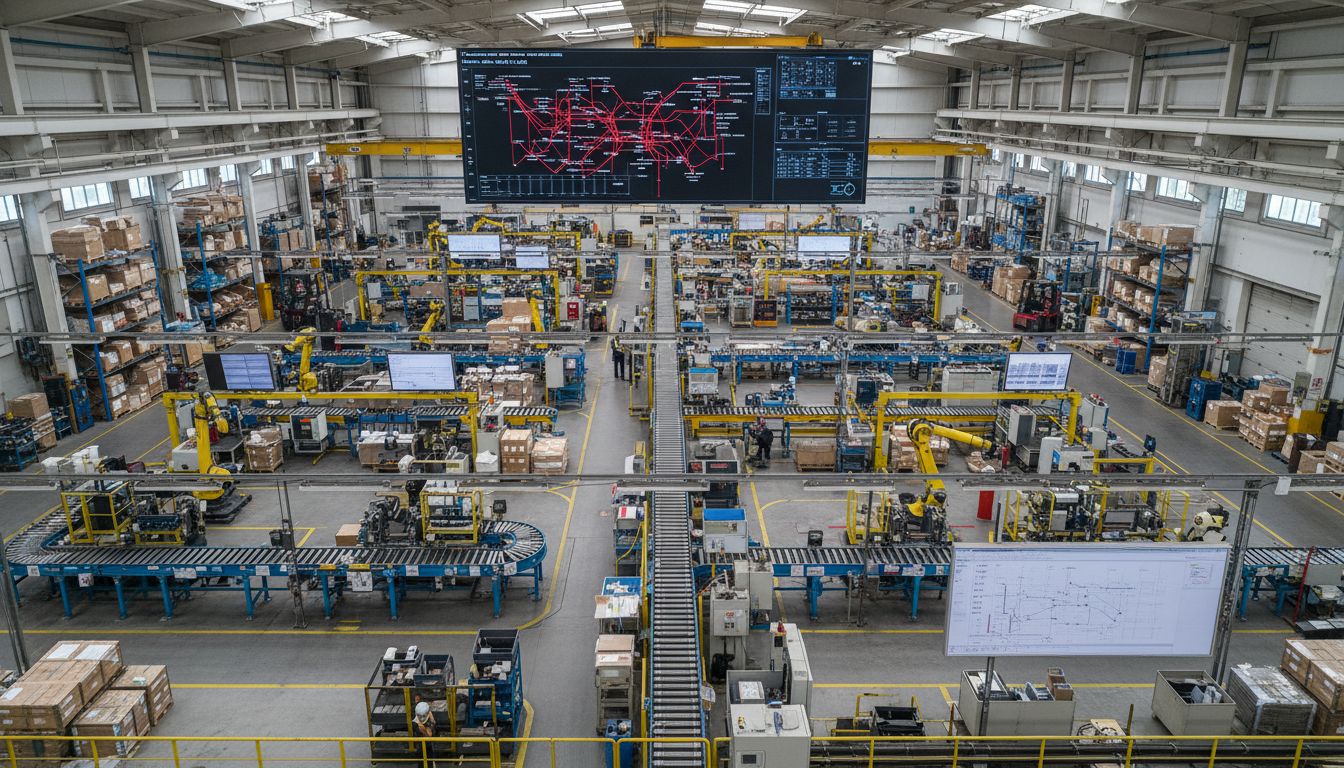7 Types of AI-Driven Tasks for Business Success

AI-driven tasks are showing up in nearly every business, touching everything from customer service to supply chain logistics. Most people expect automation to just mean faster and cheaper, but that only scratches the surface. The real surprise is that companies using AI-driven tasks can see productivity gains of up to 40%, and the biggest wins come from combining human expertise with smart technology in ways nobody expected.
Table of Contents
- Understanding AI-Driven Tasks
- Data Analysis And Insights
- Customer Service Automation
- Personalized Marketing Strategies
- Inventory Management Optimization
- Predictive Maintenance Solutions
- Enhancing Decision-Making Processes
Quick Summary
| Takeaway | Explanation |
|---|---|
| AI enhances productivity up to 40% | Organizations using AI-driven tasks can significantly boost efficiency, impacting multiple functional areas positively. |
| Data analysis increases decision-making effectiveness by 60% | AI analytics uncover patterns, improving insights and reducing uncertainties in business decisions. |
| Customer service automation improves response times by 70% | Intelligent systems enhance support quality while maintaining high customer satisfaction levels. |
| Predictive maintenance reduces downtime by 70% | Proactively anticipating equipment failures leads to significant cost savings and operational efficiency. |
| AI supports nuanced decision-making processes | Enhanced tools enable businesses to process complex data, leading to informed and strategic choices. |
1: Understanding AI-Driven Tasks
AI-driven tasks represent a transformative approach to business operations, fundamentally changing how organizations leverage technology to achieve strategic objectives. At its core, an AI-driven task involves using artificial intelligence to automate, optimize, or enhance a specific business process through intelligent algorithms and machine learning capabilities. These tasks go beyond simple automation by incorporating adaptive intelligence that can learn, predict, and improve over time.
Businesses today recognize that AI is not about replacing human workers but empowering them with intelligent tools that handle complex, repetitive, or data-intensive activities. According to McKinsey Global Institute, organizations that successfully integrate AI-driven tasks can experience productivity gains of up to 40% across various functional areas.
Key characteristics of effective AI-driven tasks include:
- Precision: Consistently executing tasks with minimal error rates
- Scalability: Ability to handle increasing workloads without proportional resource increases
- Continuous Learning: Improving performance through ongoing data analysis and pattern recognition
For business owners, understanding AI-driven tasks means recognizing them as strategic tools that complement human expertise. Read more about human-AI collaboration in our guide on understanding the role of humans in AI, which emphasizes that successful AI implementation requires thoughtful human oversight and strategic direction.
The potential of AI-driven tasks spans multiple business domains, from customer service and marketing to finance and operations. By identifying and implementing these tasks strategically, businesses can unlock new levels of efficiency, insights, and competitive advantage.
2: Data Analysis and Insights
Data analysis and insights represent a critical AI-driven task that transforms raw information into strategic business intelligence. Modern organizations generate massive volumes of data, but extracting meaningful insights requires sophisticated AI technologies capable of processing complex datasets rapidly and accurately.
AI-powered data analysis goes beyond traditional statistical methods by uncovering hidden patterns, predicting future trends, and providing actionable recommendations. Gartner Research indicates that companies utilizing advanced AI analytics can improve their decision-making processes by up to 60%, reducing operational uncertainties.
Key advantages of AI-driven data analysis include:
- Predictive Capabilities: Forecasting future business trends with high accuracy
- Real-time Processing: Analyzing massive datasets within seconds
- Unbiased Insights: Eliminating human cognitive biases from data interpretation
Businesses across industries leverage AI for data insights in multiple domains, such as customer behavior prediction, financial risk assessment, and market trend analysis. Explore how AI can help you build real marketing value by transforming complex data into strategic opportunities.
The most successful organizations view data analysis not as a technical task but as a strategic imperative. AI enables businesses to move from reactive reporting to proactive intelligence, where data becomes a dynamic tool for continuous improvement and competitive advantage. By implementing intelligent data analysis systems, companies can unlock deeper understanding of their operations, customers, and market dynamics.
3: Customer Service Automation
Customer service automation represents a powerful AI-driven task that revolutionizes how businesses interact with their clients. Intelligent automation transforms traditional customer support models by providing faster, more consistent, and personalized interactions without sacrificing human connection.
Modern AI-powered customer service solutions leverage natural language processing and machine learning to handle complex customer inquiries efficiently. According to Salesforce Research, companies implementing advanced customer service automation can reduce response times by up to 70% while maintaining high customer satisfaction levels.
Key capabilities of customer service automation include:
- 24/7 Availability: Providing instant support regardless of time zones
- Multilingual Support: Communicating across different languages seamlessly
- Personalized Interactions: Tailoring responses based on individual customer history
Explore our guide on AI automations that can boost your business efficiency, which highlights the transformative potential of intelligent customer service strategies.
Successful customer service automation goes beyond chatbots and automated responses. Intelligent systems can now analyze customer sentiment, predict potential issues, and provide proactive support. By integrating human oversight with AI capabilities, businesses can create more responsive, empathetic, and efficient customer service experiences that build long-term customer loyalty and trust.
4: Personalized Marketing Strategies
Personalized marketing strategies powered by AI represent a sophisticated approach to connecting with customers through targeted, intelligent communication. Unlike traditional mass marketing techniques, AI-driven personalization enables businesses to craft unique experiences that resonate deeply with individual consumer preferences and behaviors.
AI transforms marketing from a broad-based approach to a precision-driven strategy that anticipates customer needs before they arise. Harvard Business Review reports that companies utilizing advanced personalization techniques can see up to a 20% increase in marketing effectiveness and customer engagement.
Key elements of AI-powered personalized marketing include:
- Predictive Consumer Behavior: Analyzing individual customer data to forecast future purchasing patterns
- Dynamic Content Customization: Automatically adjusting marketing messages based on real-time user interactions
- Micro-Targeting: Segmenting audiences with unprecedented granularity
Explore our insights on building real marketing value with AI, which provides a deeper understanding of strategic marketing transformation.
The most innovative businesses recognize that personalization is not about overwhelming customers with information, but delivering precisely what they need at the right moment. AI enables marketers to create seamless, intuitive experiences that feel natural and relevant. By leveraging machine learning algorithms, businesses can develop marketing strategies that adapt continuously, ensuring each customer interaction becomes more refined and effective over time.
5: Inventory Management Optimization
Inventory management optimization emerges as a critical AI-driven task that transforms how businesses track, predict, and manage their product resources. Intelligent inventory systems leverage advanced algorithms to provide real-time insights, reducing waste and maximizing operational efficiency.
AI-powered inventory management goes far beyond traditional tracking methods by creating dynamic, predictive models that anticipate market demands and supply chain fluctuations. McKinsey & Company reports that companies implementing advanced AI inventory optimization can reduce inventory holding costs by up to 35% while improving product availability.
Key capabilities of AI-driven inventory management include:
- Demand Forecasting: Predicting future product requirements with remarkable accuracy
- Automated Restocking: Triggering purchase orders based on intelligent predictions
- Real-time Inventory Tracking: Monitoring stock levels across multiple locations instantly
Explore our guide on AI automations to boost your business efficiency, which provides deeper insights into strategic optimization techniques.
The most successful businesses view inventory management not as a static process but as a dynamic, intelligent ecosystem. By integrating machine learning algorithms with existing supply chain systems, companies can create more responsive, adaptive inventory strategies that minimize surplus, reduce stockouts, and optimize resource allocation. AI transforms inventory management from a reactive cost center into a proactive strategic advantage that directly impacts bottom-line performance.
6: Predictive Maintenance Solutions
Predictive maintenance solutions represent a revolutionary AI-driven approach that transforms how businesses monitor, maintain, and optimize their critical equipment and infrastructure. Intelligent maintenance systems leverage advanced sensors, machine learning algorithms, and real-time data analysis to predict potential failures before they occur, dramatically reducing downtime and maintenance costs.
Deloitte Research indicates that companies implementing predictive maintenance can reduce equipment breakdowns by up to 70% and decrease overall maintenance costs by 25% through proactive intervention and strategic planning.
Key advantages of AI-powered predictive maintenance include:
- Early Failure Detection: Identifying potential equipment issues before they become critical
- Optimization of Maintenance Schedules: Planning interventions based on actual equipment condition
- Reduced Unexpected Downtime: Minimizing operational interruptions through intelligent monitoring
Explore our insights on AI automations to boost business efficiency, which provides a comprehensive overview of strategic technological implementations.
The most innovative organizations recognize predictive maintenance as more than a technical solution. AI transforms maintenance from a reactive cost center into a strategic performance optimizer. By combining sensor data, machine learning algorithms, and domain expertise, businesses can create intelligent maintenance ecosystems that not only prevent failures but also provide deeper insights into equipment performance, lifecycle management, and operational efficiency. This approach enables companies to make data-driven decisions that extend equipment lifespan, reduce unexpected repairs, and ultimately drive significant bottom-line improvements.
7: Enhancing Decision-Making Processes
Enhancing decision-making processes through AI represents a sophisticated approach to strategic business management, transforming how organizations interpret complex information and generate actionable insights. Intelligent decision support systems leverage advanced algorithms and machine learning to provide nuanced, data-driven recommendations that go beyond traditional analytical methods.
Gartner Research reveals that organizations implementing AI-enhanced decision-making processes can improve their strategic outcomes by up to 50%, reducing cognitive biases and accelerating response times to market changes.
Key capabilities of AI-driven decision enhancement include:
- Scenario Simulation: Modeling multiple potential outcomes with precise probability assessments
- Real-time Data Integration: Combining diverse data sources for comprehensive analysis
- Risk Mitigation: Identifying potential challenges before they become critical issues
Learn more about the role of AI in strategic decision making, which provides deeper insights into intelligent decision support strategies.
The most forward-thinking businesses understand that AI is not about replacing human judgment, but augmenting it. By providing leaders with sophisticated analytical tools, AI enables more informed, nuanced, and strategic decision-making. These intelligent systems process vast amounts of information, recognize complex patterns, and present insights that might remain hidden through traditional analysis, ultimately empowering business leaders to make more confident and precise strategic choices.
This comprehensive table summarizes the seven main types of AI-driven business tasks discussed in the article, highlighting their core benefits and use cases for operational excellence and business growth.
| AI-Driven Task | Description | Key Benefit/Outcome |
|---|---|---|
| Data Analysis and Insights | Turns raw data into actionable insights using AI for pattern detection and prediction | Improves decision-making effectiveness by up to 60% |
| Customer Service Automation | Uses intelligent automation for rapid, personalized customer support | Reduces response times by up to 70%, enhancing satisfaction |
| Personalized Marketing Strategies | Leverages AI to deliver targeted, dynamic marketing tailored to individual preferences | Increases marketing effectiveness by up to 20% |
| Inventory Management Optimization | Applies AI to forecast demand and automate restocking in real time | Cuts holding costs by up to 35%, boosts availability |
| Predictive Maintenance Solutions | Employs sensors and machine learning to predict and prevent equipment failures | Reduces downtime by up to 70%, lowers maintenance costs |
| Enhancing Decision-Making Processes | Uses AI to simulate scenarios and integrate data for smarter strategic choices | Improves strategic outcomes by up to 50% |
| Overall Productivity with AI | Combines human expertise with AI for adaptive, scalable task automation across the organization | Increases productivity by up to 40% in multiple business areas |
Transform AI-Driven Tasks Into Real Business Results
Are you ready to move beyond theory and start seeing the real benefits of AI-driven tasks like data analysis, predictive maintenance, and personalized marketing? Many leaders struggle to translate AI potential into concrete results, especially when facing challenges like costly inefficiencies, data overload, or inconsistent customer experiences. This article highlights how artificial intelligence can optimize decision-making, streamline inventory management, and empower your teams with actionable insights. But turning these opportunities into lasting value demands strategic guidance and tailored solutions that truly fit your business model.

If you want actionable outcomes instead of generic advice, partner with a team that brings over 25 years of leadership expertise working with businesses just like yours. Visit Average Robot today to explore how our hands-on approach can help you implement AI for operational efficiency, risk mitigation, and growth. Take the next step and discover how you can build real marketing value with AI. Secure your future by unlocking the competitive advantage of AI now—our solutions are designed to be accessible, practical, and aligned with your business goals.
Frequently Asked Questions
What are AI-driven tasks in business?
AI-driven tasks in business involve using artificial intelligence to automate, optimize, or enhance specific business processes. These tasks utilize intelligent algorithms and machine learning capabilities to improve efficiency and decision-making.
How can AI improve data analysis in my business?
AI enhances data analysis by uncovering hidden patterns, predicting future trends, and providing actionable recommendations. This capability allows businesses to make informed decisions based on comprehensive insights from large datasets.
What benefits does customer service automation provide?
Customer service automation offers benefits such as 24/7 availability, faster response times, and personalized interactions. AI-powered systems can handle complex inquiries, improving customer satisfaction while reducing operational costs.
How does AI enhance inventory management?
AI enhances inventory management by providing real-time insights, predicting demands accurately, and automating restocking processes. This optimization leads to reduced holding costs and improved product availability.




